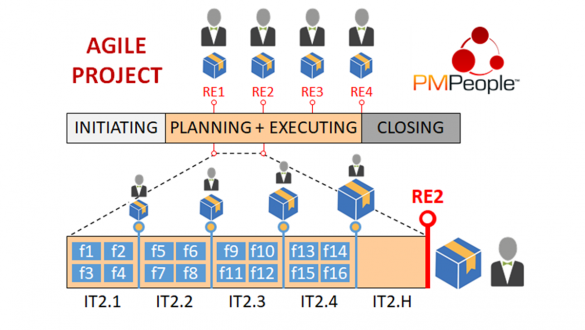Controlling Agile Projects
In agile projects, there is a disturbing complacency about failure. We are used to statements like «I’ve seen no software project delivered on time, on budget». Do you really think this a problem without a solution? If we let the team do their tasks but nobody is accountable for the project, why is it a surprise when the project is behind schedule and over budget? Agile projects must be controlled as well.
Agile Case Study (5/5): Closing the First Release
This is the fifth and last post on the chapter 23 of the book Agile Estimating and Planning, by Mike Cohn. In the previous post the team was about to start the first 2 week iteration, planned with 4 stories and 18 points. They also forecasted a…
Agile Case Study (4/5): Release Planning
Fourth post on the chapter 23 of the book Agile Estimating and Planning, by Mike Cohn. In the previous post the Havannah team met with on this agenda: First sprint planning. Market research outcomes review. Initial estimate for the release plan and the project schedule. First point…
Agile Case Study (3/5): Planning the First Sprint
Third post on the chapter 23 of the book Agile Estimating and Planning, by Mike Cohn. In the previous post the Havannah team had written 32 user stories, totaling 146 story points. In this post, team members are working on another project, while analyst Delanie start a…
Agile Case Study (2/5): User Stories
Let’s continue reading chapter 23 of the book Agile Estimating and Planning, by Mike Cohn. In this second post you will realize about the convenience of writing down physical cards and how to conduct a brainstorming session to make team members infer requirements, a.k.a. user stories. A piece…
Agile Case Study (1/5): Project kick-off
The following case study is originally published as the chapter 23 of the Mike Cohn’s book entitled Agile Estimating and Planning. In this chapter, the author, in order to summarize and put into practice many key points explained in the book, develops a case on…
A Project Management Toolbox for the Project Economy
Organizations in the project economy can start using good freemium tools today, no investment required upfront. If free features are enough, they can continue free forever, focusing on value rather than technology. Nowadays, a free project management toolbox can meet the needs of most projects.
Setting the PMO up in 1 week
Organizations in the project economy cannot wait 6 months to have a PMO up and running. Thanks to our tool PMPeople, PMO activation does not have to be a long expensive project anymore. All the technology can be set up in 1 week so that you can focus on the PMO function. In this short period, now is technically possible to have many people collaborating on project management, using different roles.
Citizen Development in The Project Economy
A citizen developer is a user without coding knowledge who creates new business applications for consumption by others using LCNC Development Platforms sanctioned by corporate IT. By 2024, more than 65% of software projects in the project economy will include at least one citizen developer. This doesn’t mean software teams will ignore IT, rather the opposite.
Welcome to PMPeople University!
PMPeople University service is available today! Any accredited organization providing courses in project management can now use PMPeople for half price. Online support for students and trainers is also included. Save money if you pay for other PM tools and provide an up-to-date learning experience practicing collaborative professional project management with PMPeople. If you are interested, please email us to info@pmpeople.org with the subject: “UNIVERSITY”.
Categories
- Business (16)
- Demand Management Roles (14)
- Frequently Asked Questions (7)
- Guide (26)
- People (23)
- Assignments (2)
- Feedback (2)
- Project Team (3)
- Tracking Time And Expenses (2)
- Process (9)
- Closing (2)
- Executing And Controlling (2)
- Planning (1)
- Project Management (67)
- Management Frameworks (18)
- Organization Owner (OO) (3)
- Project Economy (54)
- Tools (19)
- Supply Management Roles (5)
- Training (6)
- Uncategorized (1)








